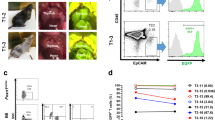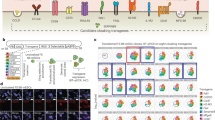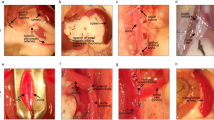Abstract
MOUSE egg-cylinders transplanted to extrauterine sites develop either as teratomas (benign tumours composed of adult tissues) or as teratocarcinomas (retransplantable malignant tumours containing, in addition, undifferentiated embryonic carcinoma cells)1–4. Rat egg-cylinders similarly transplanted, however, always develop as teratoma5. When transplanted to a syngeneic host, C57BL mouse egg-cylinders develop as teratomas but when transplanted to (C3H × C57BL)F1 hybrids they develop into teratocarcinoma3,4. This suggests that the host reaction is important in determining the fate of a transplanted embryo. Specific embryonic and foetal antigens which are re-expressed during malignant transformation are now well established6–8, and we thought that an immunological reaction of the host against embryonic antigens in the egg-cylinder might determine whether the transplant develops as teratoma or teratocarcinoma. Splenomegaly is considered to be a sign that a host has reacted to the antigenic stimulation of a graft or tumour9,10, and we have found that although it is always present in mice with transplanted egg-cylinders, it is much more pronounced in those with teratocarcinoma. Splenectomy, however, reduced the growth of the transplanted embryos, suggesting that the immunological reaction of the host stimulates the growth of the graft.
This is a preview of subscription content, access via your institution
Access options
Subscribe to this journal
Receive 51 print issues and online access
$199.00 per year
only $3.90 per issue
Buy this article
- Purchase on Springer Link
- Instant access to full article PDF
Prices may be subject to local taxes which are calculated during checkout
Similar content being viewed by others
References
Solter, D., Škreb, N., and Damjanov, I., Nature, 227, 503 (1970).
Damjanov, I., Solter, D., Belicza, M., and Škrep, N., J. natn. Cancer Inst., 46, 471 (1971).
Škreb, N., Damjanov, I., and Solter, D., in Cell differentiation (edit. by Harris R., Alin, P. and Viza, D.) 151 (Munksgaard, Copenhagen, 1972).
Damjanov, I., and Solter, D., Z. Krebsforsch, 81, 63 (1974).
Škreb, N., Švajger, A., and Levak-Švajger, B., J. embryol. exp. Morph., 25, 47 (1971).
Anderson, N. G., and Coggin, jun., J. H., in Proc. first Conf. and Workshop on embryonic and fetal antigens in cancer (edit. by Anderson, N. G., and Coggin, J. H., jun.), 7 (National Technical Information Service, US Department of Commerce, Springfield, Virginia, 1971).
Alexander, P., Nature, 235, 137 (1972).
Coggin, jun., J. H., and Anderson, N. G., in Embryonic and fetal antigens in cancer (edit. by Anderson, N. G., Coggin, J. H., jun., Cole, E., and Holleman, J. W.), 2, 91 (National Technical Information Service, US Department of Commerce, Springfield, Virginia, 1972).
Woodruff, M. F. A., and Symes, M. O., Br. J. Cancer, 16, 120 (1962).
Blamey, R. W., and Evans, D. M. D., Br. J. Cancer, 25, 527 (1971).
Eichwald, E. J., and Silmser, C. R., Transplant. Bull., 2, 148 (1955).
Kondå, S., Nakao, Y., and Smith, R. T., Cancer Res., 33, 2247 (1973).
Stevens, L. C., Devl Biol., 21, 364 (1970).
Prehn, R. T., Science, 176, 170 (1972).
Hellström, K. E., Hellström, I., and Braun, J., Nature, 224, 914 (1969).
Author information
Authors and Affiliations
Additional information
to which reprint requests should be sent: Wistar Institute, Philadelphia, Pennsylvania 19104.
Rights and permissions
About this article
Cite this article
DAMJANOV, I., SOLTER, D. Embryo-derived teratocarcinomas elicit splenomegaly in syngeneic host. Nature 249, 569–571 (1974). https://doi.org/10.1038/249569a0
Received:
Revised:
Issue Date:
DOI: https://doi.org/10.1038/249569a0
Comments
By submitting a comment you agree to abide by our Terms and Community Guidelines. If you find something abusive or that does not comply with our terms or guidelines please flag it as inappropriate.



